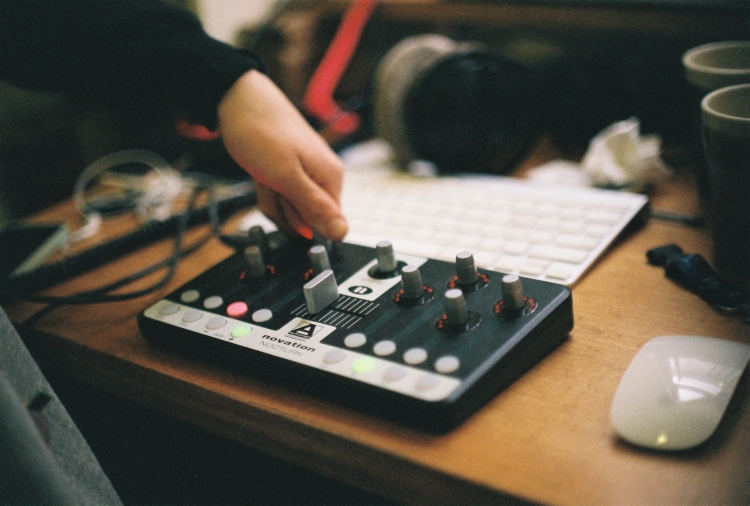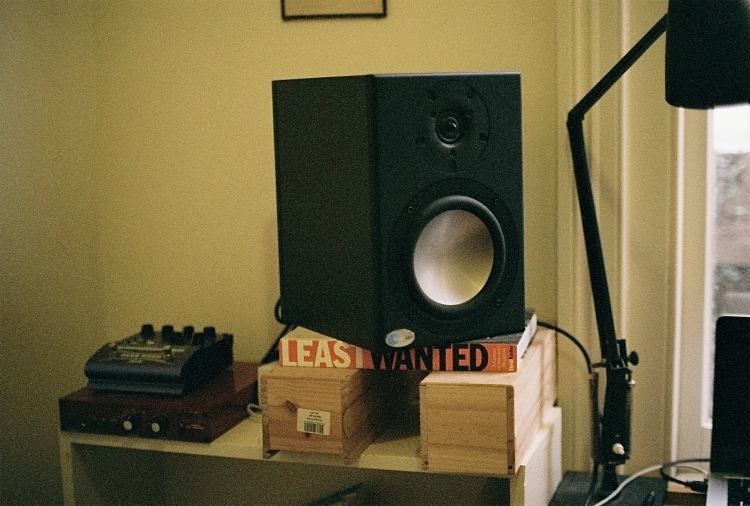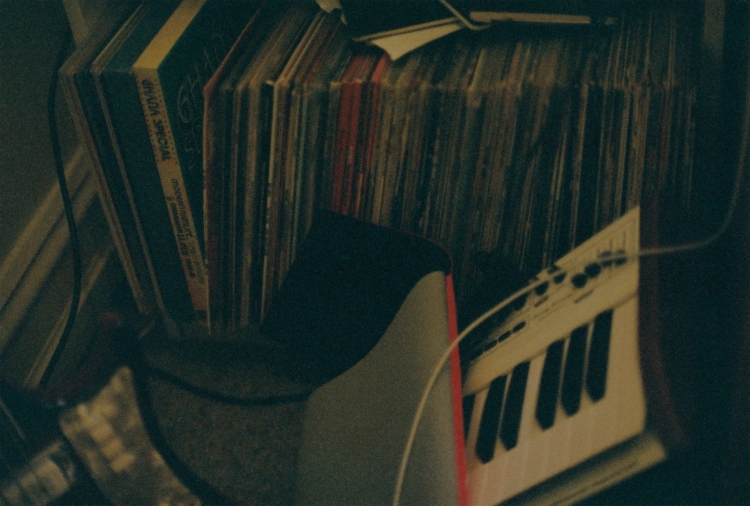
Martin King is, above all, a lover of pop music.
He loves pop in all its weird hybrid sub-forms, and esoteric offshoots.
He loves pop for all its inner confusions and contradictions, for its bizarre juxtapositions and conflations. He loves the strange points of cross-over and discord that make up the constantly evolving, multi-headed, weird and wacky monolith that is pop.
His flexible taste is echoed through the diversity of his own musical pursuits. He is drummer for soulful Melbourne R’n’B-crooners, The Harpoons, and singer and collaborator with Oscar V Slorach-Thorn for their duo, Oscar + Martin. He has been a longtime travelling choir singer, an amateur keyboardist, a DJ, and is now an an emerging solo musical producer. First and foremost, however, Martin is a music fanboy in the purest sense of the term.
Despite his now being twenty-five years old, fan boy, not man, seems a more fitting title for his particular brand of childlike enthusiasm. When he speaks he leans straight forward into his slight shoulders; his boyish face, dimpled cheeks, and wide eyes all assimilate into a semblance of absolute earnest, as he insists that yes, this is what I like, this is what is happening, this is what now is. And this is why you should like it, know it, get on board with it, too.
One unexpected recipient of his fandom is the precocious Aussie export; the statuesque, blonde rapper Iggy Azalea.
In Australia, where ugly skip-hop rap accents dominate the airwaves Martin says that “part of the reason I like her is that I like that she exists.”
“I love the fact that she is probably Australia’s biggest rapper, and she raps with an American accent, and she doesn’t engage with the Australian rap scene at all, “ he says. “She’s not afraid to do American rap, in the American market, and it’s really working for her.”
He sees her success as a kind of affront to the hugely popular Aussie hip-hop scene that he positively hates.
“They rap in this way that affects the accent to sound horrible, really atrocious,” he says. “It’s still an affected accent, it’s not like them talking over music, loudly and more rhythmically, it’s an accent that they’re putting on to rap.”
While he doesn’t entirely agree with Azalea’s use of a false American accent, he understands it as a response to the pressure to rap in a hyper-stylised Australian drawl. In general, however, he thinks, “you should just rap more neutrally, because the Australian accent isn’t very appealing.”
“I’m not really sure why (I like her) because some of the stuff she does is really atrociously bad, and her rapping is not very good, but I just like that she’s representing Australia.”
She is an emblem for Australia on the world stage; on her own, albeit distinctively borrowed, musical terms.
The music that she is creating articulates a sound that Martin has also been exploring for his upcoming solo EP release, Fitness by Martin King Vol. 1. The EP as it stands features seven tracks, a couple of which are remixes. The sound he is experimenting with is a fusion of dark, thunderous hip-hop trap beats with European trance-inspired effects, that squeal and whip through the tracks, jolting the tempo in bizarre, sudden flashes like sonic lightning. One of his pieces of inspiration was Azalea’s collaboration with Steve Aoki, Back 2 Tha Future. He is interested in “the way it moves between being traditional trap beats, and then it starts to speed up, and starts to turn into this Euro sounding Dance music, which is really cool and weird,” he says. “It’s so bizarre, it sounds like Crazy Frog, but I really like it.”
A lot of the time when he’s making music he will just listen to artists he likes, to try to “rip the shit out of what they do.”
However, his tracks never directly betray his influences. They are never precisely the “same thing.”
His current project has been the result of parallel interests in these Euro-trap sounds, and in 80s-inspired epic, futuristic sounding synths. He has been heavily inspired by composer Vangelis, and his soundtrack for Blade Runner. Martin describes him as one of the “pioneers of epic synth sound.”
“My influences might be an EP with trap beat sounds, but it’s not even pure trap, it’s Euro-trap. I’ll listen to it and try to make my own version of Euro-trap but then at the same time be listening to Vangelis and understanding how he uses synths.”
“Then they merge together and it becomes it’s own thing,” he says.
“The stuff that I’m working on at the moment, is more Dance music influenced,” he says. “But it’s not Dance music at all, because I made it, and I’m not an Italian guy sitting on cheesy keyboards,” he says.
His music is representative of the musical moment which we are currently living in, where “people are drawing reference from everywhere.”
There is a trend for using Ableton Live to create this distinctive hybrid sound.
“But it won’t have a name until maybe five years in the future, when the genre changes again,” he says.
Ableton Live is Martin’s production tool of choice. Rather than operating like a tape recorder in the way that Protools does, it operates much in the same way, as “an MPC, the original hardware music composing tools, where they had pads that can be drums, or synths.”
“They have lots of levels, with lots of different abilities to loop sections and manipulate the sounds that you’re working with,” he says.
This software is useful for writing songs and recording them simultaneously.
He uses a combination of sounds already found on the software, samples of his own voice and keyboards, and beats. All these layered, tweaked sounds coincide to create his genre spanning sound.
Martin is currently working on honing his songwriting process. “I occasionally get it right, but often I am floundering a little bit, and I’m working on that at the moment,” he says.
Generally, when the process works, it’s when he starts with a more cohesive structure, a small passage of music with, “a tempo and a set of chords,” which he can the play repeated, and, “sing things over the top, until some lyrics and melodies start happening together.”
These beginnings usually progress more readily into finished material. He has more difficulty when his writing is fragmented into individual layers.
This will often happen if he first develops a “sick beat”, which he is sure he can make a good song on. He will then sit and try to think of a melody.
“Some of them are really good and some of them are terrible, and then I try to pick apart the good ones and stitch them together, and then it gets really messy, and then I try to put melodies onto what already exists there, which sometimes can be fine, but often is quite difficult.”
“The quicker and the more naturally it happens the better it is, whereas when you’re not confident about it and you try to piece it together over a long period of time it can become a mess, and that’s what a lot of my shit ends up being,” he says.
“When it’s good it’s pretty simultaneous; the chords and the music and melodies all come together through playing, and trying to sing, and when you sing you try to put words in, and then the words that come lead to other words,” he says.
He doesn’t see himself as being a songwriter in a “traditional” sense, where you “write a song and then work out how to sing it.”
His songs are never directly about a singular experience, or a specific understanding of an exact idea.
“I usually write about a combination of experiences but I don’t write about one thing that happened,” he says. ”If I were to write about a specific thing I would write the lyrics first and then do it the other way.”
One of the tracks from his upcoming EP, the self-professed “hit,” (or the one he is currently most happy with), is a haunting, mantra-like ballad sung over a trap beat. The lyrics are comprised of four lines repeated over the whole track: “Hold onto my hand, baby don’t be scared of me, hold on to my hand…”
The lyrics are samples of Martin’s vocals, transposed up several octaves and filtered to sound strangely feminine, or even robotic.
“They just sort of arrived, the lyrics, I had one or two of the lyrics and then that sounded right, and then sort of thought about it a bit, and wrote more lyrics,” he says.
“I have a back catalogue of a lot of different lines that just sit there, until sometimes they come out,” he says. “If I have an idea I’ll write it down, but I’ll never look at it again unless I’m right in the middle of writing a song, in which case I’ll write it out as it’s coming.”
His song writing process is based a lot around trial and error.
“One of the songs I wrote on The Harpoons record I wrote three times before it was any good, I just wrote it and got rid of it and wrote it again.”
“It’s the same with a track I wrote on the Oscar + Martin album, I wrote a verse, probably four or five times before it was sing-able, and performable.”
“When I’m finished, it’s generally just when the time’s up I can’t keep doing this anymore, because I need to get the song mixed and mastered,” he says.
His current approach to song writing has been influenced through his collaborations.
He and his long-time collaborator and friend, Oscar V Slorach-Thorn, have fairly complementary ways of working.
“Oscar and I have been working together for years, and our process is quite similar as well as our influences. I think often the outcomes sound quite different but I think we understand each other’s music quite intuitively,” he says.
“With The Harpoons I feel like my songwriting has been heavily influenced by them because they are such confident songwriters, and they’re very much about rules,” he says.
“They are things that they will always do and not do another way, in terms of having a solid structure,” he says.
Their use of pop music structures is quite strict, whereas Oscar and his methods were a little more loose to begin with.
“I didn’t know initially how to start songwriting so I adopted Jack and Henry’s (from the Harpoon’s) approach to keep the structure quite definite, just in terms of knowing what’s a verse, what’s a chorus, what’s a bridge, and where that should more or less sit.”
“That’s been an influence on my song writing more than anything, he says. “And then listening in depth to really cool songs.”
After he releases Fitness Martin has another idea in the pipeline, another genre bending ‘concept project’. It stems from a kind of in-joke between he and his partner, Zoe.
“For a long time I’ve been wanting to do grunge, I’ve been saying to Zoe, ‘fuck all this R’n’B shit, I hate this electronic music, I’ve got to go grunge, I love the Smashing Pumpkins.’”
And Zoe would make fun of him for not actually listening to the genre at all.
“Not that I listen to grunge but I think it would be cool to do,” he says.
Then, one day, his housemates were watching Queen of the Damned, the millennial Nu-metal infused vampire flick starring the late Aaliyah. Walking into the lounge room and seeing it playing he was suddenly flooded with distinct teenage memories of feeling confused and outraged when watching the film for the first time.
He remembered asking, “Why doesn’t Aaliyah sing, and where is the R’N’B Nu Metal?
“I remembered how significant that feeling was to me, that it was such a crime that that never happened, that that never existed,” he says.
“The fact that she doesn’t sing in that movie is nuts, regardless of whether it’s due to label politics, or if she died before she was able to record songs, or if they never intended her to sing in it, which is crazy in itself because it’s a music based movie featuring Aaliyah.”
The idea followed from this feeling, that he “would like to make the music that would have resulted if that combination of metal and Nu Metal and Aaliyah had happened, or taken shape.”
“It’s not like I want to make her music, because I’m not Aaliyah, and I’m never likely to be Aaliyah,” he says, laughing.
“I want to kind of create a sound that’s based on what I do,” he says. “I can’t learn to play guitar just for the sake of this new idea, but you know to work with the machines that I already work with, but to create sounds that are influenced by Grunge, and then sing R’N,B melodies over Nu-metal and grunge inspired beats.”
He wants to combine this idea with one he has had about packaging.
“Lately I have wanted to release an album on a USB stick necklace which is an idea inspired by the J-Lo Album, called Brave, which was released about five years ago, which was released as a wooden necklace that you opened up and it had a USB stick inside of it,” he said
“I found these USB sticks and they look so crazy and sick because they have an alien symbol on top,” he says.
“I like the idea of instead of making it a neat, chic, necklace, which just happens to be a USB stick on a necklace, I wanted to make it look ugly and impractical, and also to make it look futuristic and a little bit witchy.”
“ I wanted to call it Dark Cristal, which is a bit of a pun off that movie, Dark Crystal,” with a dual hip-hop cultural reference to boot.
When I ask him what ‘genre’ he wants to experiment with next, the question itself seems redundant to Martin.
“I don’t think about my music in that way.”
His style is not something that he can easily define under any preconceived category. He doesn’t really think about music in terms of genres but in terms of its articulations and intermingling of sounds, melodies and beats that he appreciates. He works towards reformulating and adapting these to fit within his own approach.
“I don’t really stick to one musical style, ever, at all,” he says.
If he were pressed he would say that his music is “is electronic music, but people think you’re talking about electro when you say that,” he says. “It’s more like synth R’N’B, but then it is, and it isn’t.”
Maybe his work lies somewhere in the discursive gaps of the pop machine; somewhere in the mix of Aaliyah, Iggy Azalea; Future Garage, Nu Metal and a USB stick.
Martin King’s upcoming EP Fitness by Martin King Vol 1 will be released soon. He is playing at Boney on 14th of September with Major Napier, Baba X, and Korean BBQ.












One thought on “Martin King”